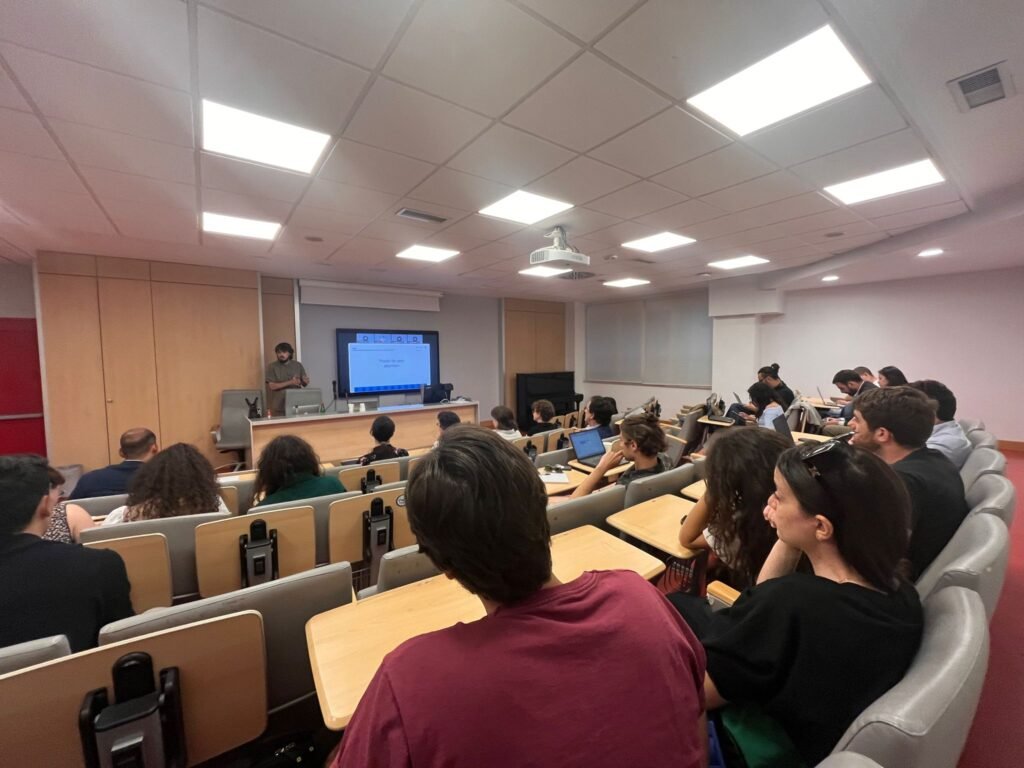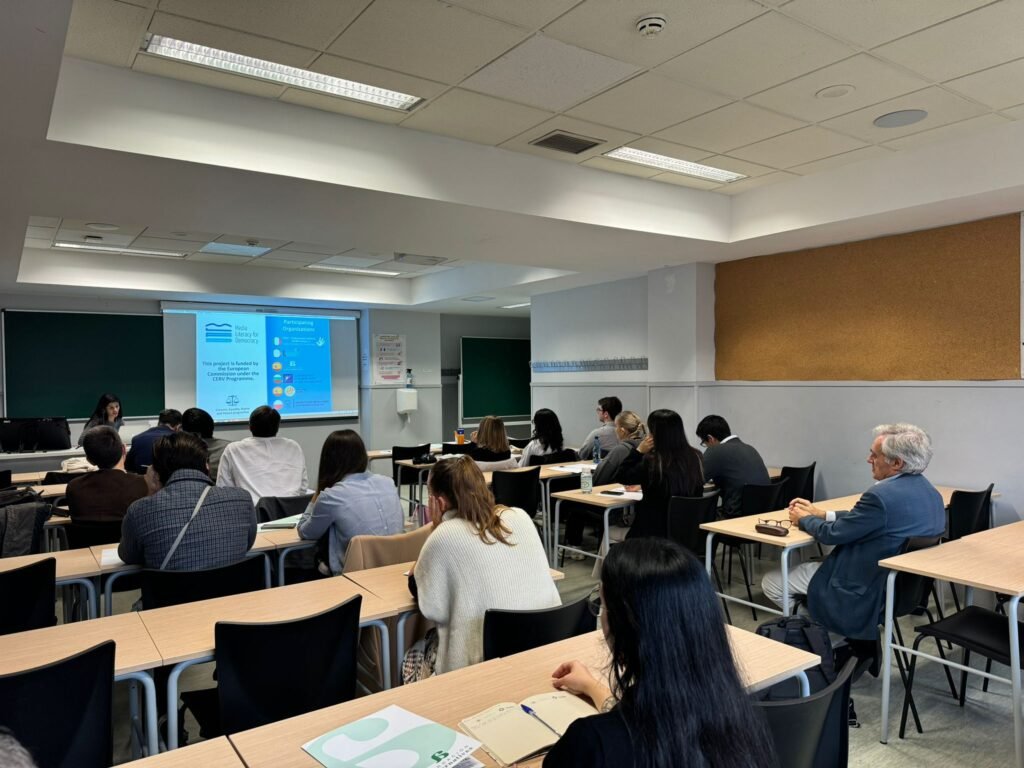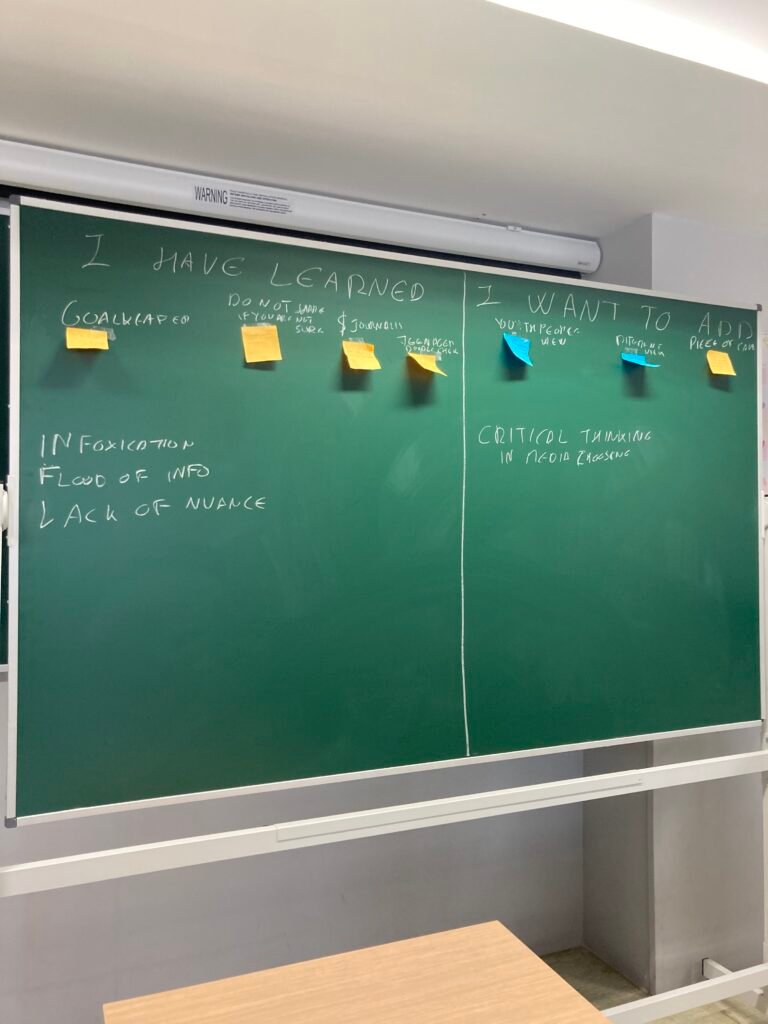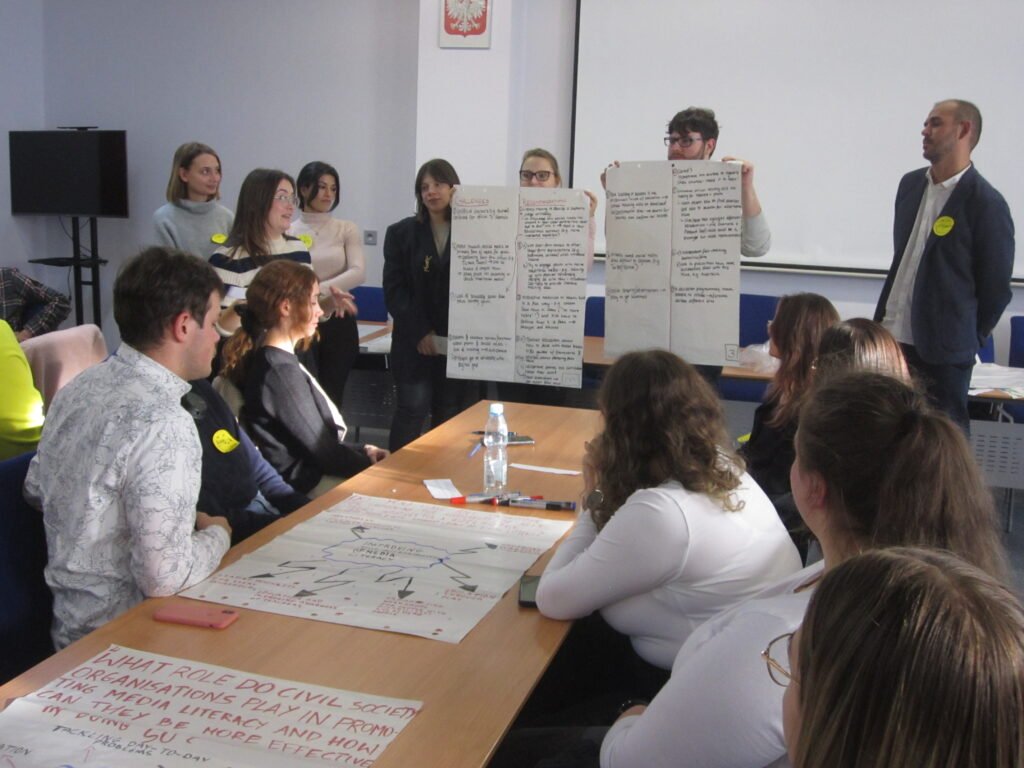Workshop in Rome
The first Media Literacy for Democracy international workshop was held on June 26th in Rome by FIDU in collaboration with the MLFD Consortium and Luiss Data Lab – School of Journalism. The event brought citizens into conversation about the various factors contributing to the spread of disinformation, policy initiatives and research that is currently being conducted, and potential strategies to promote the future of media literacy in the European Union and around the world. Students, professionals, scientists, and colleagues from Italy, Spain, Bulgaria, Poland, Ireland, and more, exchanged ideas about the role that governments, media workers, CSOs, and online platforms play in this major challenge. A panel of qualified and knowledgeable speakers communicated ways that we can raise awareness about disinformation, current techniques in tackling foreign interference, and the role of journalism in separating fact from fiction.


Eleonora Mongelli, Vice President of FIDU and MLFD coordinator, opened the event introducing the work of FIDU in the field of the media literacy, highlighting an approach aimed to raise awareness on the negative impact that disinformation campaigns have on human rights and on the right to democratic participation. She underlined the importance of a multidisciplinary approach and reminded that countering disinformation means also defending free media, academia and civil society, as these actors should be put in the condition to play their role in stimulating open debate, free from malign interference.
Alessandra Zini, Project Manager at FIDU, introduced the MLFD project and talked about the hopes of both the workshop and MLFD initiative at large, citing “cross-sector cooperation” and citizen engagement as crucial to being able to ride awareness of democratic issues in the EU.
Afterwards, Raimonda Miglinaite, Information and Communication Expert with East StratCom Task Force as a part of EEAS, sparked the conversation via Zoom with invaluable insight into the inside workings of the EU in challenging disinformation abroad, as well as the evolution of the EU’s policy framework and approach to the challenges of disinformation. She highlighted one of the most significant resources the EU has created to disseminate information to citizens and promote transparency in policy: the EU vs Disinfo website. This website shares information on how foreign actors abuse the power of information, as well as comprehensive threat reports and a Database full of thousands of instances of disinformation threats from foreign actors. The first Foreign Information Manipulation and Interference (FIMI) report breaks down the specifics of how foreign actors try to influence the European media landscape, as well as targeted recommendations by the EU to combat the effects of lies propelled by these sources. Miglinaite made clear that the website contents can be translated into a wide variety of EU languages in order to increase accessibility to citizens all over the continent and beyond.
Then, freelance journalist Cristiano Tinazzi shared with us his experiences and expertise in crisis areas around the global, as well as the ways that disinformation has manifested itself in the current events he is reporting on. He highlighted anecdotes about his time on the ground in Ukraine over the past two years and as a correspondent for a variety of Italian news sources. Specifically, he delved into the role of journalists in the fight against disinformation, the increasing polarization of media sources, and the importance of coordination between journalists, NGOs, and state actors in coordinating responses to the spread of fake news.
The panel then moved onto Salvatore Custieri, Project Manager at the Italian Digital Media Observatory (IDMO). Custieri specifically addressed the issue of regulating social media platforms and large technology companies through policy and what some potential next steps are in the EU and internationally in combatting the spread of mis- and dinformation. He explained the Digital Service Act, which will be fully enforced in Europe starting in January 2024, and what it means for large-scale social media companies such as Meta and Twitter in regards to their operations in Europe. Custieri also provided insightful critiques to the current “honor” based system of fact-checking and need for targeted, coordinated action in the EU in order to ensure transparency for users. A tailored approach to regulating speech that includes ranking platforms according to levels of social risk and liability and then taking precise measures against violations is what he recommends for the EU’s future in addressing issues concerning technology and speech.
Post Doc Researcher at University of Rome Tor Vergata, Davide Bellucci, focused his presentation on how we can stop the interaction and diffusion of fake news as a commodity. He used reasoning and theories based in economics to explain the fake news market, and then discussed his ongoing research on the question of the impact of the externalities of the content of an online source pass onto advertising brand value.
Then the microphone was handed off to Lorenzo Federico, Post Doc Researcher at Luiss Data Lab, who discussed his ongoing statistical research on the relationship between fact-checking accounts on Twitter and platform engagement. He touched on factors such as the role of frequency of activity, the existing popularity of tweets, and how preferential attachment phenomenon, which is the idea that both users and tweets that have received a certain amount of engagement will keep receiving engagement at the same rate, affect the visibility of tweets and engagement with fact-checking accounts. His research so far has shown that more negative wording in tweets are effective at “piercing the bubble” of engagement, and that the more content is posted by an account, the more consistent the engagement with that account is over time.
Lastly, the President of FIDU, Antonio Stango, made closing remarks summarizing the insights of the workshop, underlining the need for an inclusive media literacy strategy in the EU, and opening up discussions for future work to be done.
The subsequent phases of the Media Literacy for Democracy will bring this international conversation to a more diverse audience of EU citizens in Spain and Poland, furthering ideas about how to engage citizens with media-literacy techniques and the role of civil society, government, and the private sector in combatting mis- and dinformation in the EU. This will lead to a final online conference whose aim is to bring together voices from all around Europe to analyze the results of these conversations and present concrete policy recommendations which will be addressed to the relevant stakeholders.
The EDS of the workshop is available here
Workshop in Spain
The Media Literacy for Democracy international workshop, which took place in Madrid on November 14th, was hosted by Fundación Alternativas in collaboration with the University Rey Juan Carlos I. The event brought citizens into the conversation about the various factors contributing to the spread of disinformation, policy initiatives, research being conducted, and potential strategies to promote the future of media literacy in the European Union. European students and experts exchanged ideas about the role that governments, media workers, CSOs, and online platforms play in this significant challenge. A panel of qualified and knowledgeable speakers communicated ways to raise awareness about disinformation, current techniques in tackling foreign interference, and the role of journalism in separating fact from fiction.


Jorge Tuñón, professor of Journalism at Carlos III University, presented their research about the European Union’s comprehensive response to disinformation. The workshop provided a comprehensive view of the policy initiatives and efforts to counter disinformation effectively.
Miguel Martín, from Diacrónica Consulting, analyzed the messages and formats of expressions of fake news. His intervention centred on fast-spreading disinformation and manipulation through decontextualized images and words, giving examples in the written press, video, and social media. Having a set of fact-checking tools for discovering fake news was exciting. Questions to ask oneself when consuming information to avoid intentional manipulation were shared.
The panel discussion included also the journalist perspective of Alfonso Bauluz from Reporters Without Borders. He reflected on the responsibility of double-checking the pieces of information and the challenges of actual journalists in a precarious profession, where they compete with more formal and informal media. An interesting discussion was brought about war journalism, specifically on the Israel-Palestine conflict and how war reporters should do their work correctly in a complex environment where different agents try to impose a convenient message for them and how the information should be checked on complex terrains. Specific examples were analyzed.
Ongoing research presentations brought to light various aspects of disinformation, including the case study of the role that disinformation has played on the cryptocurrency phenomena and the economic effects of mis- and disinformation on a highly volatile market. Víctor Ventura, who is conducting a PhD research in this field at Juan Carlos I University, made this presentation.
The EDS of the workshop is available here
Workshop in Szczecin
The Media Literacy for Democracy workshop in Szczecin was hosted on October 18th by the the University of Szczecin at the Institute of Political Science and Security. Experts from other universities, an NGO dedicated to helping people with disabilities, and Europe Direct, among others, were also invited to participate in the event. During the event, young citizens discussed various factors contributing to the spread of disinformation, but also similar phenomena such as misinformation, malinformation, propaganda and fake news, political and social initiatives, ongoing research and potential strategies to promote the future of media literacy in the European Union, reflected on the effectiveness of various methods to verify the credibility of several information, and considered different ways to counter these threats. The workshop was divided in three parts. While the last part was completely dedicated to participants’ work, the 1st and the 2nd parts benefited from the contribution of experts.


In the first part, scholars and practitioners analysed the problem of disinformation, but also misinformation, malinformation, propaganda, and fake news. They explained what impact these problems have on democracy, human rights, various minorities, and tried to find answers on how to counter them. This part included speeches by the following experts:
Doctor Dorota Kowaleska – University of Szczecin -opened the event by introducing the topic of information overload and the rise of fake news, which constitutes a significant challenge for NGOs in their ‘battle for truth’. These organizations, which play a crucial role in addressing various societal issues, must grapple with the impact of false information on their missions, credibility, and the communities they serve. The battle against disinformation and fake news is a battle for truth, and NGOs are at the frontlines. They protect their activities not just out of self-interest but out of a deep sense of responsibility to the communities they serve and the principles they hold. Several Polish NGOs are collaborating with schools in an effort to encourage media literacy. The main purpose of this project is providing the students with the ability to critically analyse the content of news and information, and ultimately discern trustworthy outlets of information from platforms that promote fake news and hate speech.
Agata Szwed – Europe Direct – illustrated the methodologies and resources employed by the European Union in order to discourage the spread of disinformation, such as the East StratCom Task Force, which has the function of promoting effective communication by raising awareness of disinformation narratives and the negative effects produced by the lack of transparency. The EUvsDisinfo project constitutes an effective resource: its website contains a comprehensive database on cases of disinformation, as well as a quiz that tests the reader’s capability to distinguish between disinformation, satire and unbelievable facts. Szwed concluded her presentation by addressing the issue of disinformation on migration and the diffusion of stories that perpetuate stereotyped, long-standing narratives on migrants, furthermore emphasising the importance of educating younger generations on the impact that disinformation campaigns have on the most vulnerable groups.
Agnieszka Łukasik-Tureck – Professor at the Catholic University in Lublin – discussed the topic of pro-Kremlin disinformation on social media, starting from the differentiation between the various types of distorted information and subsequently illustrating the five pillars of Russia’s disinformation and propaganda ecosystem, which employs the ‘fire hose of falsehood’ technique. Professor Łukasik-Turecka concluded that, although social media is just one of the five pillars upon which the Russian disinformation ecosystem is based, it plays a significant role for two main reasons: its ability to spread content on a massive scale and the complexity of verifying the authenticity of the message.
Afterwards, Doctor Marta Szulc – the University of Szczecin – provided a meaningful insight on the effects that disinformation produces on the lives of young people, moreover describing the youth’s method of evaluating online information, based on You Tube, Instagram and TikTok — platforms that are captivating, but far less accurate. For the aforementioned reason, young people are more inclined to fall into the trap of disinformation. In addition, the majority of children gathers information from influencers and celebrities rather than traditional news outlets, demonstrating that acquiring the skills of critical thinking and media awareness is pivotal, especially in cases of digital literacy.
Weronika Gocłowska – spokesperson of the Maritime University of Szczecin – stated that lies are the driving force of interpersonal communication and carried on by investigating the motives and consequences of deviating from the truth, namely the attempt to conceal the truth, the lack of research and the lack of remorse, moreover including practical examples based on current events.
Lastly, Agnieszka Demczuk – Professor at the University of Maria Skłodowska, Curie in Lublin – dealt with the epidemic of misinformation, disinformation and conspiracy theories built around SARS-CoV-2 and COVID-19. After displaying the data related to the harmful effects that the COVID-19 infodemic — hence ‘information pandemic’ centred on rumours, stigma conspiracy theories — has produced on people’s physical and mental health, Professor Demczuk explained the reasons behind falsehood’s fast and broad diffusion and finally discussed the main sources of distorted information in Poland during the pandemic and the problems that were consequently generated by this phenomenon.
Part two featured an online panel with experts from other countries such as Georgia, Turkey, Ukraine, and Slovakia. The experts mainly discussed the problem of disinformation, misinformation, malinformation, propaganda and fake news in the Russian war against Ukraine. They mainly focused on how disinformation, propaganda, fake news are present in their media, and how their countries are fighting these threats. After the panel, a Q&A session followed.


